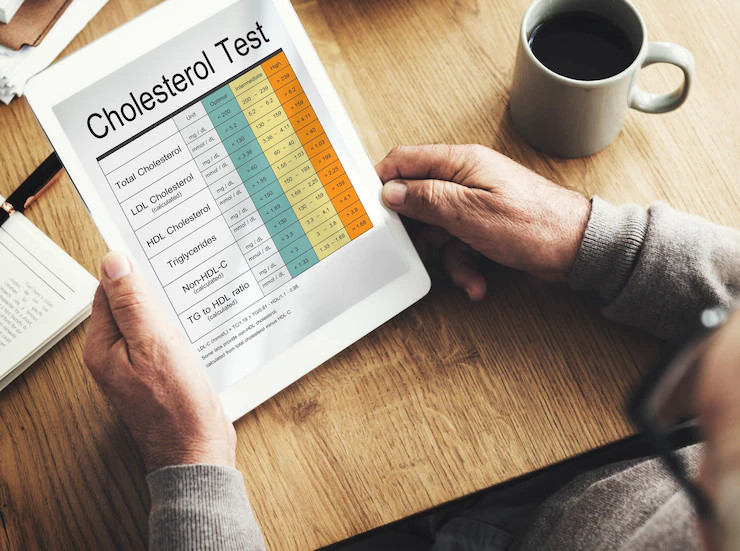When high cholesterol goes untreated, it poses several serious health risks, particularly those related to cardiovascular disease. High cholesterol is often asymptomatic, making it difficult to detect without routine blood tests.
When left unchecked, especially in the case of elevated LDL (bad cholesterol), it can lead to significant complications. Here's what you should know.
When is Cholesterol Level Considered High?
Cholesterol levels are determined through a blood test that measures total cholesterol, LDL ("bad cholesterol"), HDL ("good cholesterol"), and triglycerides. The following guidelines outline cholesterol levels:
Total Cholesterol
- Normal: < 200 mg/dL
- Threshold: between 200-239 mg/dL
- High: ≥ 240 mg/dL
LDL Cholesterol
- Normal: < 110 mg/dL
- Threshold: 130-159 mg/dL
- High: 160-189 mg/dL
- Very High: ≥ 190 mg/dL
HDL Cholesterol
- Normal: ≥ 60 mg/dL
- Low (high risk for cardiovascular disease): ≤ 50 mg/dL
Triglyceride
- Normal: < 150 mg/dL
- Threshold: 150-199 mg/dL
- High: 200-499 mg/dL
- Very High: > 500 mg/dL
Health Impacts of Untreated High Cholesterol
Cholesterol is a fatty substance that plays essential roles in building cells and producing hormones. However, elevated LDL cholesterol can lead to several serious health issues:
Coronary Heart Disease
One of the impacts of untreated high cholesterol is coronary heart disease. High LDL cholesterol leads to plaque buildup in the arteries, causing narrowing or hardening. This reduces blood flow to the heart and can lead to angina or heart attacks if arteries become fully blocked.
Stroke
Frequent elevated cholesterol increases stroke risk. A stroke occurs when blood flow to the brain is disrupted, either by blockage or rupture of a blood vessel.
Plaque formation in the brain or neck arteries reduces blood flow to the brain, resulting in oxygen deprivation, tissue damage, and impaired brain function.
High Blood Pressure
Plaque buildup on artery walls stiffens and narrows the blood vessels, causing the heart to work harder to pump blood. This increased pressure leads to high blood pressure, which further damages arteries, increases the risk of heart disease and stroke, and may cause kidney failure.
Peripheral Arterial Disease (PAD)
High cholesterol left untreated can lead to peripheral artery disease (PAD). This condition occurs when blood vessels narrow, typically in the limbs (arms, hands, calves, feet). The plaque buildup in the arteries restricts blood flow, causing symptoms like pain or cramps when walking. Without treatment, PAD can lead to slow-healing wounds, infections, and a higher risk of amputation.
Diabetes and Metabolic Syndrome
Cholesterol isn't the only factor leading to diabetes. Excess body fat and high cholesterol levels are known contributors to diabetes and metabolic syndromes. Research shows that people with diabetes are more likely to suffer from heart disease and stroke when cholesterol levels are poorly controlled. Furthermore, high cholesterol exacerbates insulin resistance, a key factor in the development of type 2 diabetes..
Liver Function Disorders
Chronically elevated cholesterol can lead to fat accumulation in the liver, a condition known as non-alcoholic fatty liver disease (NAFLD). Left unchecked, this can progress into more severe issues such as non-alcoholic steatohepatitis (NASH), leading to liver damage, cirrhosis, and liver cancer.
It's crucial to manage and prevent high cholesterol through lifestyle changes and, when necessary, regular medication. Always consult a doctor, especially if you're at risk for high cholesterol. You can also use the Ai Care health consultation service, available via the App Store or Play Store, for guidance.
Want to know more about other diseases? Click here!
- dr Nadia Opmalina
Cleveland Clinic (2022). Hyperlipidemia. Available from: https://my.clevelandclinic.org/health/diseases/21656-hyperlipidemia
Cleveland Clinic (2022). High Cholesterol Diseases. Available from: https://my.clevelandclinic.org/health/articles/11918-cholesterol-high-cholesterol-diseases
American Heart Association (2022). Consequences of High Cholesterol. Available from: https://www.heart.org/-/media/Files/Health-Topics/Cholesterol/Consequences-of-high-cholesterol.pdf
WebMD (2023). Diseases Linked to High Cholesterol. Available from: https://www.webmd.com/cholesterol-management/diseases-linked-high-cholesterol
John Hopkins Medicine. Lipid Panel. Available from: https://www.hopkinsmedicine.org/health/treatment-tests-and-therapies/lipid-panel
Medline Plus (2024). Cholesterol Levels: What You Need to Know. Available from: https://medlineplus.gov/cholesterollevelswhatyouneedtoknow.html
NHS UK (2021). Angina. Available from: https://www.nhs.uk/conditions/angina/












